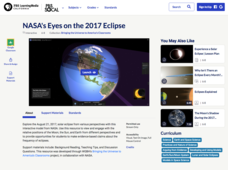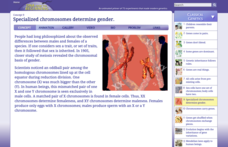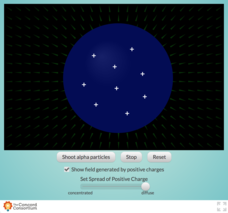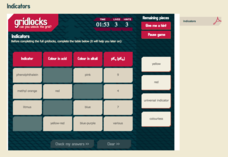Laboratory for Atmospheric and Space Physics
Science at 100,000 Feet
Take your class up, up, and away with an engaging weather balloon simulation! Individuals get hands-on experience in creating and launching their own airborne labs to study how temperature and pressure affect substances at 100,000...
Scholastic
Study Jams! The Moon
Take your class to the moon and back with this compact slide show. A mix of computer-generated images and photographs are supported by explanatory text. Observers learn about the moon's movements, its physical features, and its phases....
Scholastic
Study Jams! The Senses: Seeing
What will viewers see when they watch this video about vision? They will observe RJ and Sam hanging out during a power outage with Rookie, the dog. The boys discuss the structure of the eye (pupil, iris, cornea, lens, retina,...
Scholastic
Study Jams! Scientific Methods
Middle school scientists learn the steps of the scientific method by watching this phenomenal film and by singing a karaoke song! They are introduced to making observations and hypotheses, determining variables, data collection, and...
CK-12 Foundation
Development of Hypotheses: Pressure versus Temperature
Is it me, or is it getting hot in here? Middle school science sleuths investigate the relationship between temperature and pressure, then use their observations to form a hypothesis. Questions embedded in the interactive help guide...
Scholastic
Study Jams! Investigations to Collect Data
Print out the lyrics or show the karaoke video to get your scientists singing about the scientific process! Participants will warble about observations and measurements, data and physical properties. Consider sharing this resource after...
Concord Consortium
Pendulum and Spring
Up, down, back, and forth. When you make a pendulum out of a spring, there's a lot to observe. Aspiring masters of motion examine the combined kinetic energies of spring and pendulum motion using a detailed interactive. Learners observe...
Concord Consortium
Exploring Electron Properties
Bring a historic chemistry experiment to life in your classroom! Introduce pupils to Thompson's ground-breaking discovery of the electron through a cathode ray simulation. The resource allows users to study the behavior of both electrons...
PBS
NASA's Eyes on the 2017 Eclipse
How did the 2017 eclipse look in Los Angeles—or Chicago? Experience both views, plus many more, using a lesson from PBS's Space series for middle schoolers. Scholars follow the movements of the sun, moon, and Earth during the most recent...
Concord Consortium
Double Pendulum
What's better than a pendulum for studying motion and periods? A double pendulum! Young physical scientists use an interactive to explore pendulum motion—times two. The resource boasts a host of parameters to change and a running graph...
CK-12 Foundation
Rocks: Anatomy of Granite
Get earth science students excited about the formation of rocks with an engaging interactive resource. Learners analyze the composition of granite, then study the various processes that work together to make igneous, sedimentary, and...
Biology in Motion
Evolution Lab
Evolution occurs though change over time, but can it go any faster? Scholars speed up the process of evolution and observe a simulation of 20 blue organisms fighting for survival. A graph displays the changes in phenotype over time. By...
Howard Hughes Medical Institute
How Animals Use Sound to Communicate
Communication involves the visual, auditory, olfactory, and tactile senses. Scholars observe groups of animals communicating through multiple senses. They note and learn why different species use different senses depending on their...
Curated OER
English Vocabulary Skills: AWL Sublist 3 - Exercise 6c
In this online interactive English vocabulary skills worksheet, students answer 10 matching questions which require them to fill in the blanks in 10 sentences. Students may submit their answers to be scored.
CK-12 Foundation
Rocks and Processes of the Rock Cycle: One Rocks Turns to Another...
Geology scholars test their rock identification skills in an interactive that examines the rock cycle from the three main nodes of rocks. Other topics include visual clues to rock identity and the conditions needed to make rocks change...
Cold Spring Harbor Laboratory
Specialized Chromosomes Determine Gender
Are you an XX or an XY? Budding scientists learn about cellular fertilization and the determination of gender in a thorough online lesson. They follow their study with a set of interactive reflection questions.
Concord Consortium
Gas Pressure in a Syringe
Plunge into a gas pressure activity! Junior physical scientists manipulate a syringe to study the particle model of gases. The interactive invites investigations of particle movements in capped versus uncapped syringes.
Concord Consortium
Collisions and Kinetic Energy
Can your physical science classes describe what happens when two objects collide? Whether they are new to the study of kinetic energy or just brushing up on their skills, pupils can observe the outcome of a variety of collisions...
PBS
Coastline Change
Continental drift happens over millions of years, but new perspective shows much faster changes. An informative resource offers a short term perspective using a series of satellite images. Viewers observe major changes to a coastline in...
Concord Consortium
Specific Heat and Latent Heat in Condensation
There's more to melting than meets the eye! Junior physical chemists investigate the differences between specific and latent heats as a substance undergoes a phase change. Users remove heat from the system and observe changes in kinetic...
Concord Consortium
Opposites Attract
Whether they pull together or push away from one another, magnets are sure-fire pupil pleasers! Take their study of magnetism to a new level with a fun interactive. Individuals control the polarity of two spheres to observe attractive or...
Concord Consortium
Concentrating Charge and Electric Fields
How did Rutherford determine that the nucleus was the center of an atom? Take a look inside the famous Gold Foil Experiment with an interesting interactive. Learners fire a beam of alpha particles at a nucleus containing variable...
Royal Society of Chemistry
Indicators
How do chemists know what indicator solution is the perfect match for the acid or base they're studying? Discover a rainbow of indicator-related properties with an Internet resource. Individuals relate the indicator solution to its...
PBS
Earthquakes and Volcanoes
Earth's surface constantly changes thanks to a variety of geological forces; in fact, Australia currently moves faster than GPS technology. Scholars connect the idea of continental drift to earthquakes and volcanoes with the help of an...




















